Workshops
The Bachelor of Arts (Fine Art) has a two stage enrolment process in 2020. In stage one, you will enrol via Enrolment Online into our courses for semesters one and two. Please check stage one is complete before proceeding. In stage two, you will select your semester 2 classes for Fine Art Studio, Workshop and ART: History+Theory+Cultures via a preferencing process system.
This page will assist you with stage two of the enrolment process. Here you will find a list of potential semester 2 Workshop classes.
(Note: There is a separate page for Fine Art Studio classes and a separate page for ART: History+Theory+Cultures classes.)
You will only take one Workshop class in semester 1, but you need to list two (2) preferences. These workshops will be for both first and second year students and will be offered under the following course codes:
Workshop 3 VART 3651 (2nd year students)
Workshop 5 VART 3653 (3rd year students)
These are the course codes you enrolled into in stage one of the process.
Read the list below carefully and select two (2) Workshop classes you would be happy to take for semester 1. The 2020 preferencing process will be communicated to you by email at a later date.
Remember, these Workshop classes are 12 credit point courses and will require 3 contact hours per week plus associated learner directed hours.
IMPORTANT PLEASE NOTE: You must not repeat any class in your preference lists. Every effort will be made to place you in your first preference classes.
Although we would like to offer all of the Workshop options below, classes are subject to viability and may not run if numbers are too low.
Course Information
Offering Studio & Studio Lead/Coordinator
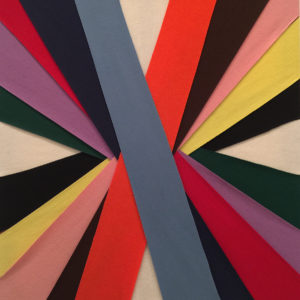
Image Credit: Anne-Marie May, Untitled (Construction of coloured rays), 1993, Coloured felt, NGV Collection. Photograph Peter Ellis
Advanced Painting (section 13)
In this workshop, you will develop an understanding of the expanded field of painting to encompass painting as image and object, on and off the wall. You will experience an expansive view of painting and its contemporary applications. You will engage with installation strategies that invite exploration into site-specific work, time-based practice, the ephemeral, material process and the use of traditional and experimental media. The focus for the workshop is on key developments in historic and contemporary painting as image, narrative and object, painting’s relationship with photography and the internet, the relationship to space, the environment and the viewer. You will experience a series of propositions and projects that guide you towards an individual, sustainable practice that complements your fine art studio. You will experience trial installations, student presentations, visual lectures, gallery visits, supportive feedback and individual and group tutorials.
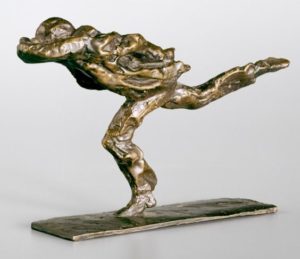
RICK AMOR RUNNING MAN, 1989, NGV COLLECTION Margaret Stewart Endowment, 1991
© Rick Amor/Licensed by Copyright Agency, Australia
Bronze Foundry (section 3) CANCELLED
In this course you will develop practical skills across a range of processes and materials commonly used in sculptural practice in the bronze foundry. You will be introduced to methods and materials involved in lost wax casting in order to make small bronze works. This method involves the completion of a series of steps from wax modelling, plaster and sand investments, melting and pouring bronze, finishing and patination. You will undertake these steps in sequence and as a group and this will require hands-on attendance at all classes. The course is mainly practical but with appropriate tutorial presentations covering theoretical and relevant historical background.
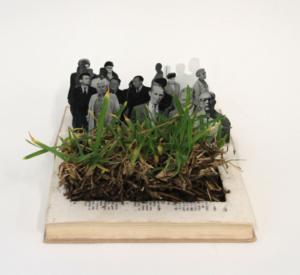
Image credit: Molly Burrage, altered book, 2019. Photograph by Jazmina Cininas
Book as Art Object (section 2)
This Workshop has been designed to provide Fine Art students with an expanded understanding of the book as a vehicle for artistic expression, through exploring the relationship between binding method and content. In this class, you will explore the possibilities offered by the artist book for the presentation of visual information and ideas. A broad range of book binding techniques incorporating expanded concertina, multiple signature, and hard cover book binding methods will be introduced in face-to-face studio workshops. Demonstrations will be supplemented by lectures, excursions and peer-to-peer learning that will help to advance concepts and content as you create your own original book-based art objects.
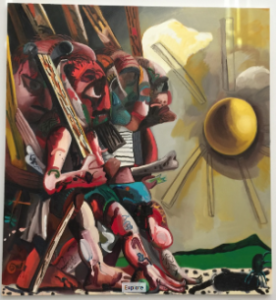
Image Credit. Dana Schutz, Beat out the sun, 2018, Oil on Canvas copyright the artist . Courtesy petzel gallery New York .Photo Peter Ellis
Contemporary Figuration (section 4)
In this studio based workshop you will investigate a diverse range of conceptual and technical aspects of figuration. Through a series of projects you will experience the human image and the broader framework of the real, the landscape, the natural world and the body. Using strategies such as observation, models, reproductions and film as source material you will develop an individual approach to contemporary figuration. You will investigate ideas of narrative, distortion, movement, emptiness, and trace as form and content, in a way that explores the unique place of figuration in contemporary art. This workshop will enable you to explore the relationship between painting, drawing, photography, social media and film. Research and experimentation is a core strategy of the workshop leading to a group of individual resolved artworks. Visual lectures, individual and group tutorials, field trips, and demonstrations complement this workshop.
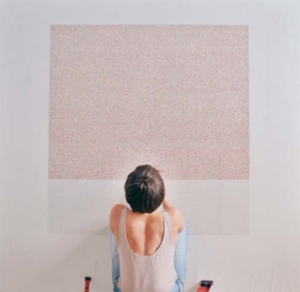
Image Credit: Tessa Lancashire, siddhartha, 2016, coloured pencil on coated poly-cotton cloth, 200 x 200cm (studio view).
Drawing Disegno Discourse (section 5)
In this course, you will develop essential skills of envisioning, expressing and transforming your ideas through drawing. Based in the concept of disegno as a knowledge generating activity that integrates perception, action and cognition you will engage drawing as a primary means of working with ideas and forms, processes, gestures and experiences. This course provides strategies and methods for you to transform your thoughts and perceptions into autonomous artworks through drawing based practices. Objectives are to frame Drawing as a stand-alone practice that can be further articulated through individual practice. You will gain skills in iterative strategies that generate artistic departure points for complex and resolved art works. You will examine how knowledge and making are linked through ways of seeing and thinking and investigate pictorial languages and conceptual approaches to communication through the making of creative works in your studio production.
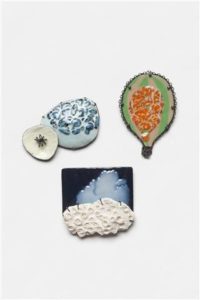
Naoko Inuzuka
Enamelling (section 8)
In this course students, will focus on small scale enamelling for all fine artists. Vitreous enamel surfaces are created with glass like powders and liquids applied to metal surfaces and fired in a kiln at approx. 800 celcius. This glass suface provides jewel like qualities and lustrous and layered colours and patterns over copper, silver and steel. Students will research individual subject matter to create their own personal iconography in enamel. Students will learn how to translate their ideas and drawings using enamel over metal surfaces using process such as stencilling, sifting, drawing, painting, foiling and sgraffito.
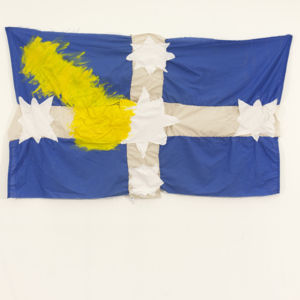
Image Credit: Tim Greaves, FLAG REMIX, 2014 , 70 x 150cm
Hybrid 2D (section 12)
In this course you will develop skills in combining picture making, visual research, composite materials and the object-body as a way of generating new knowledge and ideas for your studio practice.
The 2 dimensional ground is a place or body informing play and experimentation; to bring new ideas together, to translate and recombine public and personal meanings. This course provides a range of individual research strategies formed around cycles of making and principles of assemblage, collage, montage, unmaking and reworking the visual image and experiential object.
Objectives are to extend your skills to transform mediums, to complement your emerging studio practice through individually realised projects and to develop awareness and understanding of how broad social and cultural perspectives can be reflected in contemporary art practice.
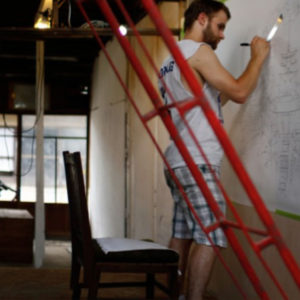
Student on site, Tammy Hulbert
Internship (section 7) CANCELLED
In this course, you will participate in an internship or artist in residence program in an arts or cultural organisation, company, festival, gallery, museum or studio, through dual negotiation with the industry and the School of Art. You will be expected to work as directed by the host organisation, to address and solve real issues in an arts industry workplace environment.
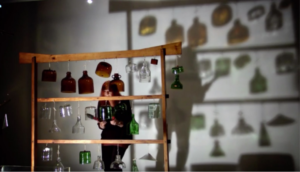
Ros Bandt, Floating Glass Nov 2012
Instrument building for Artists (section 11)
In this course you will have the opportunity to work with renowned Melbourne artist Dale Gorfinkel where you will explore techniques and materials that have resonating and sound generating potential. Working with found objects, raw materials as well as elemental forces such as wind and water, you will learn to listen, analyse and experiment with qualities such as tone, timbre, volume, pitch and texture, exploring ways in which these qualities may contribute to a creative outcome. You will be guided in various ways in which to activate and compose with your ‘instruments’ through microphone recording, performance and installation.
No previous experience necessary
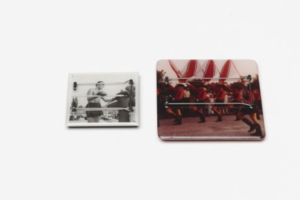
Kiko Gianocca, Brooches – ‘with other eyes’
Jewellery & Object Verso (cancelled)
In this course, you will undertake a series of creative projects where you will explore the back of the object as a starting point in creating Jewellery and Objects. The verso or the reverse of the object is often the area least considered as it may be hidden from view. But what if it is the most important part of an object. How can this hidden aspect add value or meaning to the reading of an object. You will explore the hidden aspects of art objects, domestic objects and everyday found objects to develop ideas for the ways in which you might activate the reverse or hidden side of an object. At the completion of the semester you will have produced a body of jewellery and object works.
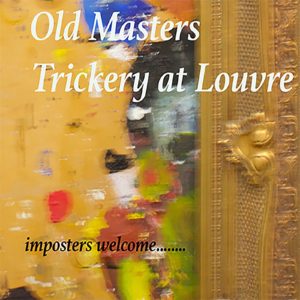
Phil Edwards, Old Masters Trickery at the Louvre - Imposters Welcome, 201, Colour, Photocopy Print, Image courtesy of the artist, Copyright: Phil Edwards
Literature, Text and Visual Arts (section 1)
This course investigates and explores the relationship between text and visual art, with specific reference to narrative literature. The relationship between the visual arts and literature is historically intimate, complex and ongoing. Early historical examples of illustrated books and public imagery of text will be referenced in this workshop as examples of how these arts interact. Through a series of initial short projects you will explore aspects of poetry, novels, scientific writing or advertising in combination with the practices of drawing, painting and other media including digital media associated with a contemporary studio practice. It is envisaged that after some brief introductory group exercises, lectures and excursions to the State Library you will, develop a personal major resolved project that explores text and narrative in a visual art context suitable for expanding your individual studio interests. You will experience collaborative practices and a wide range of media including traditional the experimental. There will be consultative flexibility in the organization of these projects. Outcomes of the course will include a class zine for publication as well as individual artworks such as drawings, posters, paintings or digital media suitable for exhibition. This workshop is complemented by individual and group tutorials, visual lectures excursions and discussions.
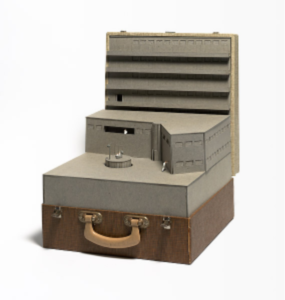
Ricky Swallow
Model for Surveillance 1999
Cardboard, wood, plastic, portable record player
NGA (copyright Ricky Swallow)
Models and Sculpture (section 14)
This course brings together the conceptual and technical skills required for model making for sculptural practice. The technical skills you will develop in this course relate to a range of sculptural materials that can be used in model making including sheet materials and materials that can be cast. Models (or maquettes) are traditionally used in sculpture to aid in the visualization of a final work but may also be shown or collected as artworks in their own right. In this workshop, you will consider the model in the broadest sense and work with a site (real or imagined) of your choice. You will develop a series of experimental models to scale and will be expected to research your site. You will also develop skills in drawing, documenting your models and presenting your ideas.
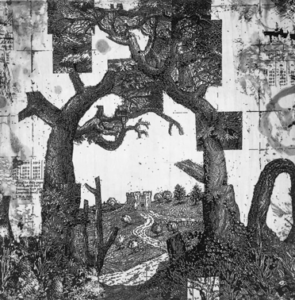
Image Credit: Courtesy of Rob Dott 2017
Photographic Etching (section 9) CANCELLED
In this course, you will further develop your understanding of analogue and digital technologies focusing on intaglio etching, with an emphasis on incorporating photographic imagery and processes. Lectures and workshops will provide a mixture of theory and technical skills enabling you to produce works and reflect on the role of traditional and electronic print media in contemporary art. This will help you to expand the aesthetic and conceptual possibilities of your art practice.
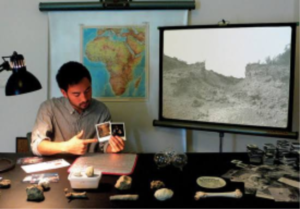
Simon Fujiwara, 2007
The Art of Fieldwork (cancelled)
Led by Melbourne contemporary artist Cath Clover, this workshop considers the notion of site, exposing you to a range of fieldwork methodologies exploring sight, sound and mobility. Working both on campus and offsite you will be guided through a series of fieldwork projects to extend your studio practice drawing on multiple methodologies such as documentary, archiving, memoir, and story-telling, working directly into a site as well as gathering materials to bring back into a studio practice. You will have the potential to draw on a range of materials such as drawing, photography mapping, recording (audio/video) collecting (found objects) walking, listening and looking. The workshop will allow you to work with a self-nominated personal site as well as significant urban sites around Melbourne such as Batman Pat and Westgate Park.
Please note that this course will involve some travel - a current Myki card and some comfortable shoes will be essential
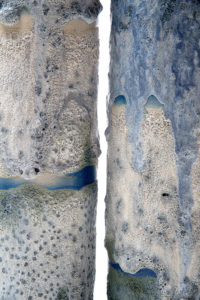
Jessica Lyons 2018
The Glazed Surface (section 16) CANCELLED
An experimental approach to key ceramic materials in glaze formulation and their role in the development of unique surfaces. How extraneous factors such as found materials, kiln atmosphere, clay bodies and methods of application can promote unexpected outcomes.
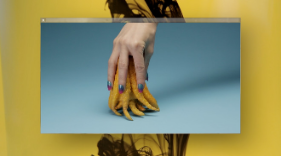
Camille Henrot, Grosse Fatigue, 2013
Video Art (section 18)
In this course you will examine technical, historical and theoretical aspects of video art practice. The course encourages you to develop a critical dialogue between your practice and the history of video art, as they relate to installation and screening-based modes of exhibition. Through a series of exercises and a program of integrated screenings, class discussions and gallery visits, the practical demands of video production will be contextualised. You will develop skills of video technology and production, including cameras, lighting editing and processing. The material covered reflects a breadth of moving image production and draws upon examples from cinema, television, video art and examples of video technology in the home, work and public arena.
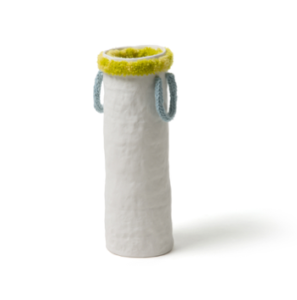
Image Credit: Bonnie Ke, Sewing with Clay, 2017, porcelain and wool
Working with Porcelain (section 17)
In this course, you will create ceramic objects where you will work with and explore the unique qualities of porcelain. The fineness and tactility of this material allows for the production of smaller scale ceramics. You will engage in a series of projects and technical explorations that will generate a personalised vocabulary of porcelain textures and forms. You will begin with an intensive project that will promote you to be experimental and explorative with this material. You will then engage with a larger project (or series?) where you will be able to synthesize these discoveries into a body of completed ceramic works.
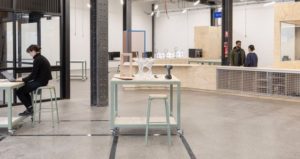
Image courtesy of FAB9, Photography by Will Neil
Working with Wood (section 6) CANCELLED
This workshop seeks to introduce students to a diversity of approaches in utilising wood and its unique qualities as a medium through which to express their ideas. Students will learn hand making, digital and machine skills necessary for working with wood in a wide range of small to medium scale applications, to enable them to cultivate a contemporary dialogue of issues informing practice and promote individual exploration.